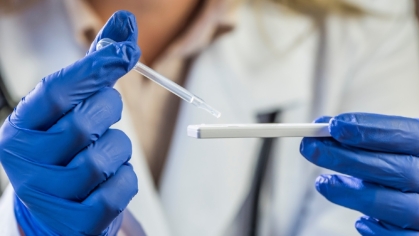Major NIH Grant is Strengthening Rutgers–Camden Research

Under the guidance of Professor of Chemistry and Center for Computational Biology (CCIB) faculty member Jinglin Fu, Rutgers–Camden students are benefiting from a grant of almost $500,000 from the National Institutes of Health (NIH). The goal of the research is to produce a new nucleic acid nanoparticle-based delivery system for the genome editing of blood stem cells.

Successful completion of this ongoing research will potentially revolutionize the treatment of various genetic disorders, such as sickle cell anemia. Genome editing involves the alteration of the genetic material of a living organism by inserting, replacing, or deleting a DNA sequence, typically aiming to improve or correct a genetic disorder. This kind of research can influence future studies and clinical applications of stem cells in regenerative medicine, which will contribute to the broader field of genetic medicine while also engaging the potential of emerging scientists.
“This grant will help us continue to develop tools for hematopoietic stem cell editing and explore its potential to treat blood disorders better,” Fu said. Hematopoietic stem cells are cells that are mainly found in bone marrow and are responsible for creating new blood cells.
Fu added that research has been done on these cells to develop new therapies for the treatment of blood disorders. However, cells naturally do not have a gene editing tool, such as the CRISPR/Cas9 gene-editing system. Currently, it is not effective enough to deliver genetic materials and tools directly into these cells on its own. Fu’s Bio-Mimetic Design and Nanoscience Lab is based in Rutgers–Camden’s Joint Health Sciences Center, a research, education, and innovation hub dedicated to advancing science and medicine throughout the region. Researchers in the lab include undergraduate and graduate students, who are exploring targeted biological systems by using complex macromolecular nanoparticles to improve the delivery of genetic material and mediate various cellular functions.

“We are developing a new nucleic acid nanoparticle (NANP) technology,” Fu said. “This nanoparticle will help deliver the CRISPR/Cas9 system into stem cells, supporting more effective genome editing.”
Fu is collaborating with the Coriell Institute of Medical Research in Camden, which is providing high-quality cells and gene function analysis needed to conduct the research.
Jian Huang, professor and interim chief scientific officer at Coriell, said, “This industry is very collaborative. I am pleased that Coriell and Rutgers have a significant partnership. There is scope for improving patient outcomes through the work of this lab and its research.”
Fu said the research aims to apply self-assembled molecular scaffolds to the organization of biomolecular networks with the intention of understanding fundamental mechanisms for biochemical cascade reactions and developing a novel regulatory toolbox.
Some students in the Fu Lab will go on to pursue advanced degrees at other universities; others will remain with the lab while earning doctoral degrees at Rutgers–Camden, going on to careers as researchers in biochemistry, pharmacology, and other related fields.
For Fu, the grant provides an excellent opportunity to turn hope into real-time benefits for individuals and their families impacted by genetic disorders.
“Since elementary school, I have been in love with science, especially chemistry,” said Fu. “I am honored to have been awarded this grant because I can see the benefits for public health and for our students who have the opportunity to revolutionize life-changing treatments delivered by nanomedicine.”


